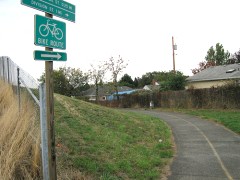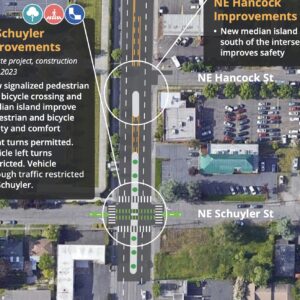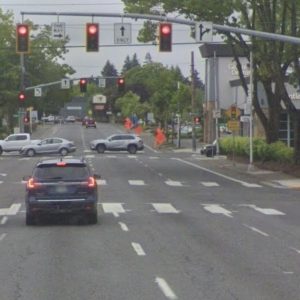
(Photo: Friends of Trees)
Local non-profit Friends of Trees will start a major tree planting effort along the I-205 bikeway this weekend. Under their “Green Space Initiative” project, and in partnership with Metro and the Oregon Department of Transportation, Friends of Trees will plant about 150, four-to-six foot trees at four different locations along the path.
We love trees on bikeways for several reasons; they create a visual and sound barrier between riders and the highway, they make our planet healthier, they give us shade in the summer and protect us from rain and wind in the winter.
The four plantings will start Saturday and will run through March of next year. Here are the dates and locations:
- December 19th – SE Yamhill & 94th
January 9th – NE Marine Dr. & 112th
January 23rd – 10600 NE Holman
February 20th – SE Pardee & 94th
Friends of Trees is inviting everyone in the community to help get these trees in the ground. For more information on how to get involved (basically, you just show up and they take care of everything else), check out this post on the Friends of Trees blog.







Thanks for reading.
BikePortland has served this community with independent community journalism since 2005. We rely on subscriptions from readers like you to survive. Your financial support is vital in keeping this valuable resource alive and well.
Please subscribe today to strengthen and expand our work.
“create a visual and sound barrier”
Won’t this also create a security problem for path users?
Any group of trees dense enough to block sound and views also provides a good place to ambush cyclists.
Vegetation should not be a security issue, particularly if the trees are set back from the pathway. Plus, 150 trees spread over several miles of corridor really isn’t that much in the grand scheme of things – that’s like one tree, 100′ apart, over three miles. Not exactly a forest.
Also, there are plenty of other pathways around town with trees right along the pathway: the Springwater Trail; trails in Washington, Forest, Mt. Tabor, and Powell Butte Parks; Terwilliger Pkwy; and so forth. To my knowledge, these areas have not been any more dangerous for cyclists than anywhere else. Someone with a mind to ambush a cyclist is probably as likely to jump out from between two parked cars on a quiet street – or just lunge at you on a sidewalk, fully visible to whole time – as they are to lurk in some forested area.
Trees do not block sound, but their roots surely do cause endos.
Jim Lee #3
You sir are correct. Lets insist that root barrier be installed adjacent to pavement. Trees are good, but heaved pavement is bad.
As functional as the i-205 path generally is, it can be a tad grim & barren in places – the tree planting will really help – Yay FOT! & yay ODOT for sanctioning it!
Sweet!
We need to weave some singletrack in through those trees, paralleling the existing I205 path so the mt. bikers can get out to Gateway Greenway. 🙂
Friends of Trees doesn’t plant and the City doesn’t give planting permits for species of trees that heave sidewalks or roads anymore. That lesson was learned years ago after landscapers went nuts planting sweetgums and the like.
Grean Space Iniative? Initiative?
Dang! Meant “Green”.
Leaves when wet create danger. DANGER DANGER DANGER! Friends of trees, enemies of traction.
OMG, Johnathon I like your site and all but… is there nothing we can do about the commenters.
Srysly, now there complaining about trees?
Trees are awesome. People are awesome. But we do leaf a lot of potentially dangerous waste for us cyclists — smog and road debris.
Trees are pretty, trees are great.
To claim that a few trees will block the sights and sounds of heavy interstate traffic is disingenuous. If trees did this you’d see a lot fewer of those large concrete walls around interstates adjacent residential neighborhoods. I doubt there is enough money to plant trees in the tight spacing required to dampen road noise more than 5~10dB.
Cosmetic application of trees will make this area look better like any civic improvement and perhaps encourage people to use who currently think that this is the hobo trail.
Conifer needle litter on the path would better than leaves but as soon as someone mentioned it I though it could be worse.
They could plant a tree that drops large round hard nuts like a hickory tree.
I’m interested in assisting in January… BUT
these better not be BLACK LOCUST trees.
On the old 205 path there was a half mile of thuja plicata south of Johnson Creek that had turned the pavement into a 6 inch washboard. With the new path one can move quickly and pleasantly. Do not change anything.
My only experience of transport by ambulance was due to roots of a tusgastuga taxifolia on a State of Oregon bike path. Not a whole lot of fun.
Please supply names of species with experimental evidence that they do not break pavement.
I feel safer along the currently wide open 205 and Marine Drive paths than the more enclosed and vegitated Springwater. I’m 180 lbs of lean, mean, alligator rastlin’ machine. If I don’t feel safe because of fewer sightlines to cars, hidden bad guys, and vagrants leaving their beer bottles and drug paraphenilia, what’s gonna encourage a mother and her defenseless kids to ride down the same paths. As my female collegues are not Amazon women(except Jamie, but we’re not sure she’s a she), they fear for their safety everytime they must pass trees where rappers could suddenly appear and do their rapping to women — and goats. Trees create shadows. Nothing good has ever come from shadows. Only horror.
I’d rather this cycleway get pedestrian margins or sidewalks before trees…if anything, trees pose a greater threat as they tend to hide wrong-way cyclists and pedestrians that can’t find the grass shoulder.
Paul Johnson (#16), I can’t believe how many times you manage to be wrong in just 3 lines. Let me help you out here:
1) It’s a multi-use path, not a “cycleway”. This means its not just for bikes.
2) What wrong-way riders? It’s a bi-directional facility.
3) Pedestrians don’t belong on the grass shoulder, unless traveling there by choice (as runners and joggers might do to spare their knees). They need paved facilities just like bicyclists do, especially vulnerable users like children, the elderly and wheelchair users where bumps and traction can be an issue.
Have you ever even ridden the I-205 path before??? Something tells me you haven’t, or else you’ve done so with blinders on.
1) I realize that, but there are bicycle lanes of travel.
2) Just because it’s a path doesn’t mean that the legal requirement to keep right is gone.
3) Pedestrians don’t belong in the lane of travel, particularly if they’re going to walk with their back to traffic. I understand pedestrians need facilities, that’s why I suggested sidewalks be installed.
Yes, I have; I was the one who mapped it. I need to do it again since it’s changed slightly thanks to the Green Line.
who is going to repair the path when the roots start raising the blacktop? You can’t cut those roots either, you just have to live with lumps in your path. Who is going to clean up the leaves? are there going to be volunteers to come out several times to rake bag and haul them away? what about all the carbon from the decomposing leaves? is there a way to offset for that?
If you guys are at all familiar with the area being discussed, the trees would be a good 15+ feet from the trail. They’re toward the top of an earthen birm that divides the path/neighborhod from the freeway (and some were planted there a year ago without any incident to report yet). As they grow; they WILL dampen the noise of the freeway. They WILL improve air quality in the area immediately surrounding the Interstate. They WILL provide habitat for birds, squirrels and the like. They WILL strengthen the earthen birm in heavy rains, and keep much of the runoff from running down the hillside and across the pathway. They WILL be pleasant to look at.
We don’t need to put the whole darn planet under concrete in an effort to save ourselves from shadows, fallen leaves and root damage.
Hello PDX,
In Seattle we have the Burke-Gilman trail that runs along the western shore of Lake Washington for much of its course. Truly a nice route, but it is lined with trees (well before the trail) and the roots make for a Paris-Roubaix like experience, minus the glory of course. I now avoid the trail because of the wash-boarding effect of the roots; indeed, it has cracked two frames of mine (both aluminum, one on the bb-shell and the other on the drive-side chain-stay).
Love, Seattle
if they are 15 ft back than I think it is a good idea. i have a 2 ft wide parking strip that freinds of trees keep coming around wanting me to put in trees there. I tell them it is a retarded idea because I am the one who gets forced to repair the sidewalk later, they just don’t get it.
trees along a bike path would be quite pleasant
I would stick with trees with very small leaves that tend to blow away easier than broadleaf like maples that just sit in a big wet clump on the ground
Is 15 feet enough room to keep the pavement free of roots and leaves?
Decades ago I helped write environmental noise regulations for the State and the City; we labored hard to convince people that trees are not effective barriers to sound; a single line of trees does not produce any measurable effect–not 1 deciBel reduction. It is discouraging to hear a responsible and progressive organization like Friends of Trees bring up the old bromide that trees reduce sound; the opposite is true when wind is blowing.
COME ON BIKE RIDING PEOPLE! Is there anything anymore that makes sense to anyone? I just returned from helping Friends plant those 100+ trees. I ride this route 5 days a week to Clackamas Town Center and welcome the aesthetic and (eventually) cooling effect of trees. If anyone should be supporting clean air, shouldn’t it be bicyclists? So, for all all you Eyeores out there, the plantings are predominantly conifers (ponderosa pine, cedar and two others – sorry I’m not an arborist). There is a smattering of oak and maple but not enough to give you folk with leaf fears any valid trepidation. Its a straight path through there anyway so if you are turning fast and sharp enough to skid its your own fault anyway. They are high up the berm and so root penetration to path is inconceivable. And for you folk with fears of nefarious characters lurking in the shadows, well, there’s drugs for that.
Thank you Friends of Trees for putting this effort together with Metro and ODOT. I know my ride through there will only be better for it.
oldguyonabike #27
Oh, man, massive fail! Ponderosa pines aren’t even native to this side of the state; they’re a high-desert species. And I’m allergic to ponderosa pines. Thanks for making the I205 cycleway a blinding blur of hay fever.
So you are saying you would rather ride an exposed car exhaust pipeline than greenway? Get back in your air conditioned car.
There is no visual obstruction of any kind in the places the way the trees are planted. I cannot believe this thread of dissention against green environmental improvement even occurred. I’m done. Enjoy the ride. Be safe.
Where did you say they were planted?
I didn’t think there was anything wrong with this path as it is. Can’t we ever leave anything alone?
For the record Ponderosa pine are native on the west side of the cascades. The whole pavement heaving issue can be avoided by installing inexpensive plastic panels into the ground along the path shoulder. (root barriers as I noted in comment #4)
Trees are good, and a little forethought and design can prevent problems.
Friday I spoke with Brighton West, who coordinated the planting at 94th and Yamhill for Friends of Trees with Metro, and on Sunday went out to the site, which is just over the pedestrian bridge from the Main Street Station on the Max Green (of course!) line.
Comments:
1. Lots of hard work went into planting several hundred expensive trees: Douglas fir, true fir, several varieties of spruce, plus some broadleaves/hardwoods. Looks like a reforestation project!
2. The plantings are on the path side of a berm, where they can contribute nothing to noise reduction, even when fully grown; the berm itself preempts that function.
3. All plantings are well away from the path, which is the old one along the west tide of I-205, mostly in the form of the neighborhood’s concrete sidewalk.
4. When the trees reach maturity there will be a tall front of dark foliage about 15 feet to the east shading the path; probably the boles of the confers will be clear of branches well above the ground.
The purpose of this is not clear; it seems to accomplish nothing.
What is wrong with open meadows, fields and moors? I like forests, but they need not be everywhere. This planting makes as much sense as downhill singletrack through Hoyt Arboretum.
Multiuse paths are dangerous for all users. They should be evenly illuminated, without shade and shadows, with good sightlines 100 feet ahead, so we can easily see pedestrians, baby strollers, dogs, other cyclists.
I applaud Friends of Trees, but I would rather cycle safely in broad daylight than through artificial forests.
Some areas of shade will be a welcome relief for those of us who walk the I-205 path. I’m excited to see that trees are being planted there!
holy crap you people are nuts! It’s just trees, you losers! we’ve got lots of them already in this part of the country.
damn bikers, ALWAYS complaining about something. now trees? seriously? TREES!
Bike people,
Tree’s help with erosion, waste water from the highway, habitat for animals, shade for people, clean air. I get that you want to have a path that is smooth and safe, I don’t get how ignorant you are to think that you are the only one’s using the path. We all have a right to use it and sometimes what is right for the greater good should be right for you.
Tree people
Paul # 28
As a bicyclist and a friend of trees I can’t help but be blown away by the negativity and anti tree zealotry here. But I want to respond to two errors of Paul’s in comment 28. The ponderosa’s planted are a subspecies of Pinus ponderosa called valley pine that is native to the Willamette Valley. Point two is that almost no one on earth is allergic to pine pollen of any type, although many think so. It has nearly non-allergenic pollen, like Doug-fir and several other trees. People often confuse pine pollen for the cause of their allergies. It’s a lovely color though.
Cheers,
Erik